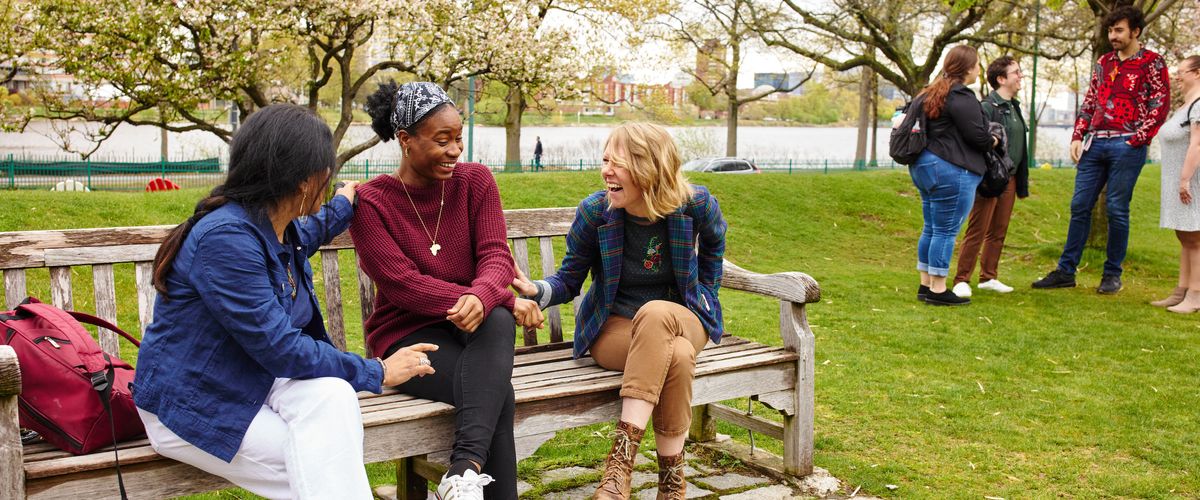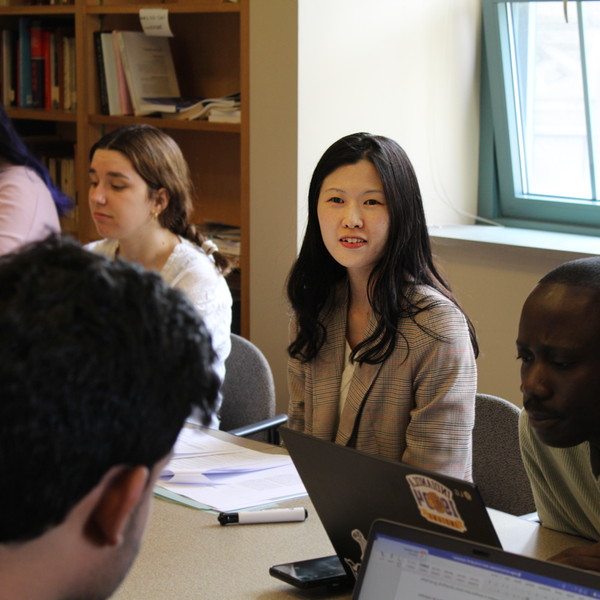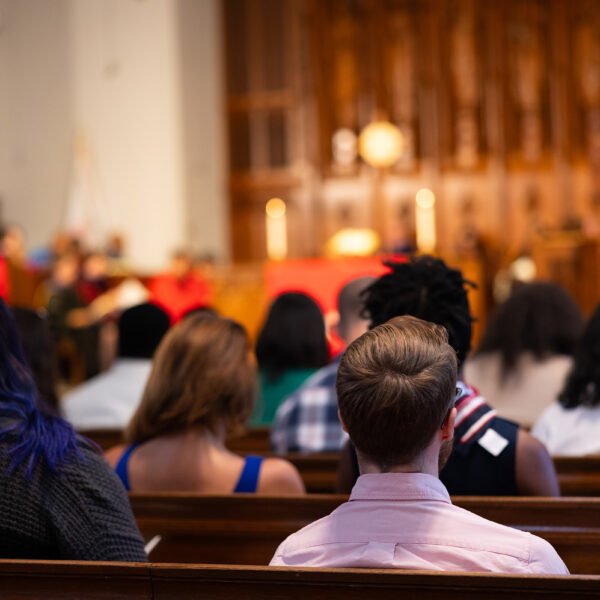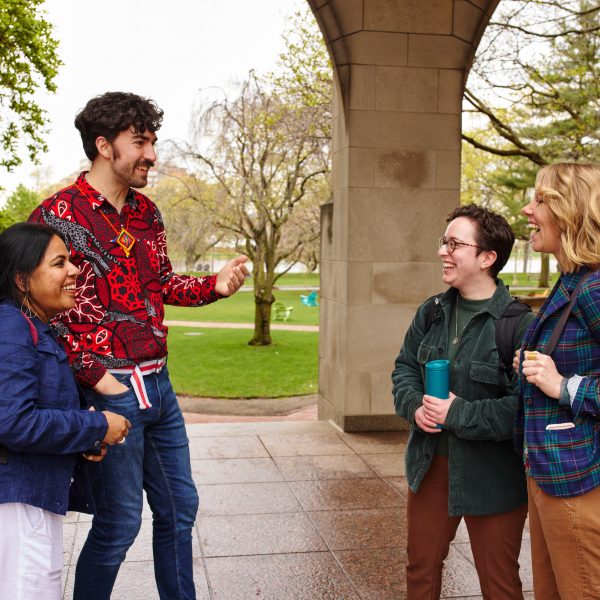How to Apply
Once you have determined which degree program is right for your academic interests and vocational goals you may begin the online application through the application portal. Our system allows you to begin an application and save, review, and change it at your leisure until you are ready to submit it. Any questions about the application process can be directed toward our Admissions Office (sthadmis@bu.edu or 617-353-3036 Monday through Friday, 9am – 5pm Eastern Standard Time).
Applications for the Fall 2024 Semester are now closed. Please check back after September 1st, 2024 to access applications for the Spring 2025 & Fall 2025 semesters.
Application Deadlines
The School of Theology matriculates students into its programs twice a year, in the fall and spring semesters. Applicants should have all materials (online application, transcripts, references, etc.) submitted by the deadlines below to be considered for admission. The School of Theology utilizes three types of application deadlines:
- Early Decision Deadlines – Applications by this date are decided before January, and eligible applicants are considered for tuition and merit scholarships.
- Priority Admissions Deadlines – Eligible applicants are considered for tuition and merit scholarships.
- Final Deadlines – This is the final date one can complete an application and be considered for matriculation in the following semester. While tuition scholarships are still likely for those who apply by the final deadline, merit awards are typically no longer available.
| For Fall Matriculation | For Spring Matriculation | |
|---|---|---|
| Master of Divinity (MDiv) | November 1 – Early Decision Deadline
January 15 – Priority Admissions Deadline May 15 – Final Deadline for international applicants July 15 – Final Deadline for domestic applicants |
October 15 – Final Deadline for both domestic and international applicants |
| Master of Theological Studies (MTS) | November 1 – Early Decision Deadline
January 15 – Priority Admissions Deadline May 15 – Final Deadline for international applicants July 15 – Final Deadline for domestic applicants |
October 15 – Final Deadline for both domestic and international applicants |
| Master of Sacred Music (MSM) | December 1 – Pre-audition materials upload deadline
January 1 – Final Deadline for all other application materials to be received, same deadline for both domestic and international applicants |
The MSM program does not admit for spring matriculation. |
| Master of Arts in Religion and Public Leadership (MARPL) | July 1 – Final Deadline | November 1 – Final Deadline |
| Master of Sacred Theology (STM) | May 15 – Final Deadline for international applicants
July 15 – Final Deadline for domestic applicants |
October 15 – Final Deadline for both domestic and international applicants |
| Doctor of Philosophy (PhD) | December 15 – Final Deadline for both domestic and international applicants | The PhD program does not admit for spring matriculation. |
| Doctor of Ministry (DMin) | May 15 – Final Deadline for both domestic and international applicants | October 15 – Final Deadline for both domestic and international applicants |
Application Checklist
| Item: | Please note: |
|---|---|
| Completed Online Application | There is a $95 non-refundable application fee for all programs, which is paid by credit card within the online application system. |
| Digital copies (PDF preferred) of unofficial transcripts from all academic institutions where applicant has received previous academic credit |
|
| 3 Letters of Reference |
MDiv and MSM Applicants:
MTS, STM, MARPL, and PhD Applicants: Your three academic references may be from a previous college or seminary professor, academic advisor, or Dean/President. You may choose to have one professional reference in exchange for an academic reference if that person can speak to your abilities as a scholar, researcher, or teacher. DMin Applicants:
|
| Personal Statement | All master’s program applicants answer the following question: In a statement of 500 words, describe and reflect on your life journey and the vocational directions toward which you are pointed. All doctoral program applicants answer the following question: In a statement of 1,500 words, please describe your goals in undertaking doctoral study in your given field, including an indication, even if only general at this point, of your proposed focus and research. Also, how have your experience and study to this point helped prepare you for this doctoral program and your proposed research focus? Applicants seeking to transfer from another institution must include in their personal statement the reasons they are seeking a transfer, and must upload a recently-issued letter of good standing from their previous institution to the online application. Please see the “Transfer Students” section below. |
| Application Essay (master’s applicants only) | All master’s program applicants answer the following question: In a 500-word essay, describe and interpret a favorite book or movie with commentary on why it is meaningful to you. |
| Standardized Test Results (only international students for whom English is not a native language) |
NOTE: If you have completed a previous degree in English, you can have your institution’s Registrar Office send a letter to the Enrollment Office (sthadmis@bu.edu) confirming that the medium of instruction was English. This will allow you to have the English proficiency requirement waived. As of the Fall 2021 application cycle, the School of Theology does not require and will not accept the GRE for any of its master’s or doctoral programs. |
| Resume/CV | Your current resume or curriculum vitae should include your previous education, relevant work history, volunteer or service work, and any additional information you would like the Admissions Committee to know about your background |
| Sample of Scholarly Writing (doctoral applicants only) | PhD applicants’ writing samples should not exceed 30 pages in length. Feel free to excerpt from a larger work or thesis, including an abstract of the entire piece and an indication that the sample is an excerpt from the whole.
DMin applicants’ writing samples should not exceed 10 pages in length, and should be scholarly in nature, rather than a sermon-style piece. It should include a bibliography and reflect the applicant’s ability to do solid independent research in their field of interest. Feel free to excerpt from a larger work or thesis, including an abstract of the entire piece and an indication that the sample is an excerpt from the whole. |
| International Student Documentation (international applicants only) |
In addition to completing the online application and credentials listed above, all international applicants must provide documentation to be considered by the United States government for a Student Visa. Those items include:
|
Transcripts – Frequently Asked Questions
What constitutes an unofficial transcript?
What if I’ve transferred between several institutions? Do I need to send unofficial copies of all my transcripts?
Do I need to complete the WES (World Education Service) transcript evaluation as part of my application if I took courses at a school outside of the United States?
Transfer Students
The Boston University School of Theology welcomes transfer students from other institutions. Applicants for transfer into a degree program are evaluated on the same basis as other applicants. Applicants may also be eligible for consideration for merit awards based on the same criteria as other applicants for admission.
Students may transfer credits from any graduate theological school accredited by the ATS or other comparable accrediting agency if transferring from outside of North America. In every instance, course equivalents are determined on an individual basis, by petition, and only when that coursework is demonstrated to be relevant to the course of study being pursued in the School of Theology, as determined by the Associate Dean of Academic Affairs, operating on behalf of the faculty. Applicants for transfer must include in their personal statement the reasons they are seeking a transfer, and must provide a recently-issued letter of good standing from their previous institution. Please see the School of Theology’s Academic Bulletin for the latest Admissions Transfer Policy.
Advanced Standing
Incoming first-level master’s students who have taken previous courses in religious studies may be able to earn advanced standing in certain academic disciplines by sending a petition to the Office of the Registrar, where it will then be forwarded to the Academic Dean for review. Advanced Standing is different from transfer credit in that it does not reduce the number of credit hours one must earn toward a master’s degree program. However, if an incoming student is granted advanced standing in an academic discipline, that person is able to take an advanced course in the discipline rather than the introductory course. Advanced Standing in New Testament, for example, allows an incoming student to take an upper-level New Testament course such as “Letter to the Romans” or “Gospel of John” rather than the “Introduction to the New Testament” class.
Advanced Standing permission is only applicable to required, introductory-level core courses. Those disciplines are:
| Core course for which advanced standing may be sought | Background needed to be considered for advanced standing |
|---|---|
| TO704 Hebrew Bible I | Graduate-level coursework in the study of the Hebrew Bible, including the use of historical-critical methods in their interpretation. |
| TN721 Introduction to the New Testament | Graduate-level coursework in the study of the New Testament, including the use of historical-critical methods in their interpretation. |
| TF701 Introduction to Christian Traditions and TF702 Christianity Engaging Modernity | This year-long sequence is unique to the School of Theology and is not normally eligible for advanced standing because it does not compare to coursework in other graduate programs, neither is it merely a combination of such other classes. In rare situations, students with extensive coursework in theology, history, and sociology of religion might be considered for advanced standing. |
Please note: this does not reduce the number of credit hours you must take in your program, but rather allows you to customize your curriculum toward more advanced coursework. The advanced course, moreover, must be taken at the School of Theology (not through the BTI or by transfer).
Advanced Standing is only granted when the coursework previously taken is sufficiently rigorous, employing critical scholarship in the relevant discipline. The course grade on the transcript must be a B or above. To petition for Advanced Standing, you must complete a General Petition Form, selecting “Advanced Standing” as the type of petition. (Please note: you will need your BU email address and kerberos password to complete this form.) (1) You must stipulate explicitly the course or courses in which you are requesting advanced standing and (2) attach the syllabi of all the coursework you have completed in a discipline. (3) You must also provide the transcripts from all relevant prior coursework. Your syllabi and transcripts will be reviewed by the Registrar and Academic Dean, and a decision will be communicated to you prior to registration for your first semester. Any questions about Advanced Standing should be addressed to the School of Theology’s Registrar’s Office.
| Discipline for Advanced Standing | Name of Previous Course Taken | When & Where Taken, Grade Received |
|---|---|---|
| Hebrew Bible | Introduction to Hebrew Bible | Fall 2010, Belmont University, A |
| Hebrew Bible | Understanding the Psalms | Spring 2011, Belmont University, B+ |
| New Testament | Introduction to the New Testament | Fall 2009, Iliff School of Theology, A- |



